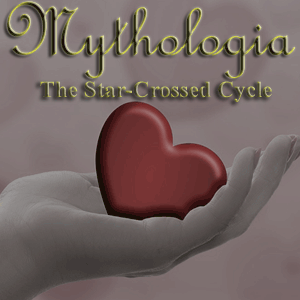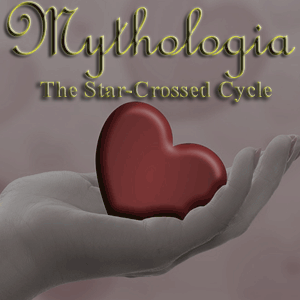Though he had been the one to step into the light, Orpheus lived the rest of his days in darkness. Never again did he allow so much as a smile to grace his lips. His lyre broken and abandoned, he kept to his vow and withheld his song from the world.
He abandoned all that had once been familiar: his father’s throne, his favored nymphs, the prosperous kingdom he called home. He left it all behind to lose himself in his sorrows. Alone, he wandered the land without end, ever estranged from both music and love.
It took less than a decade for his patron god to tire of this state of affairs. In visions, the bright god visited the young man as he languished in caves and forests.
“Where is your song?” Apollo questioned. “Why do my gifts go unused?”
“Never again. Never again.” Orpheus offered nothing more.
Frowning, Apollo turned up his palm. A bright flash of light preceded the appearance of the luminous fragments Orpheus had abandoned at the site of his failure.
“It does not do to snub the gods,” warned the God of Light. “Why not lift your voice once more? The Muses call to you.” The lyre reassembled itself in accordance with Apollo’s will. Alas, the former bard refused to so much as look upon it. “I will not. Never again.” He curled up and hugged himself.
Apollo’s beauty gave way to an unforeseen ugliness as he all but snarled at his subject. “If you withhold the light I shine through you, what good are you to me?” He leaned forward and shoved the lyre at Orpheus. “Play, mortal!” he demanded.
At last, Orpheus lifted his gaze. He reached for the lyre, but only to swipe at it with as much force as his emaciated form could muster. Apollo easily retracted it in time to spare it the abuse. Glowering fiercely, the god vanished in a blinding burst. “You will suffer for this slight!” he warned.
Orpheus cared not, or so he thought until the promised suffering came. Alone by a brook, he was discovered by the maddened followers of another of his favorite gods. They might have spared him had he surrendered to their longing for love or song. But he offered them neither, so the drunken, manic Maenads of Dionysus set upon him.
“What good is beauty if you’ll not accept worship?” seethed one as she slashed his face with her fingernails.
“What good is your voice if you’ll not raise it?” said another as she tore out his throat.
“What good is this? What good is that?” They chanted. They laughed. They pulled him to pieces. It was a slow and hideous death to which poor Orpheus was doomed, so petty were his patron gods. But even as he suffered, he lifted nary a finger in his own defense. The Maenads finally cast his head into the river and frolicked in the mess they’d made of him.
It would be months before Orpheus’ final death was discovered, and there was naught but his head to bury. But uniquely, he was spared the agony of awaiting funeral rites to open the lower paths unto him. The arrival of his soul brightened that dour realm of darkness. His vow complete, the bard was reborn, and through all of Hades, he sang.
He sang to the three-headed Cerberus, and the hound let the sound lull him to sleep.
He sang to the Ferryman of Souls, and once more, Charon carried his song.
He sang to the pit of Tartarus, and it closed shut to spare him the fall.
He sang with such passion that his song lifted from the depths of Hades to reach Olympus above. An awed Apollo watched reverently as the lyre he’d reclaimed made its own music to match the bard.
Ever quick to praise himself, the bright god beamed with pride. “In him, I have outdone myself,” he asserted in his lounge. He rose then to take the lyre in hand, and he reverently lifted it skyward.
“You vex me, blessed Orpheus, but my blessing shines the same. To heaven shall I lift your lyre to glorify thy name.”
Thus did the once-broken lyre of Orpheus ascend to join the stars. But the bard himself cared not one bit, for his glory was in the deep.
Once more before the death gods’ thrones, he faced judgment anew. Hades was as cold as ever. “You failed,” the dread god said.
“I did,” Orpheus admitted. He parted his lips to raise his voice and sing in his defense, but Hades stopped him with an upturned palm.
“Spare me,” Hades said. “Once is quite enough. Your fate is already decided.”
The Iron Queen smiled beside her King as mirth chased her own coldness away. “You’ve shown great faithfulness in your resolve to withhold your song from the world,” she said. “We would not see it silenced, but such beauty must not be left to brighten the dreary Asphodel.”
“I beg you, my Queen, and you, my King,” Orpheus said as he prostrated himself. “Only let me stand with my beloved. I’ve no tribute left to offer but my song.”
“We will take it,” Persephone said. “The lady waits in the light of my creation. You shall lend your song to its glory.”
Even the dour King spared a smile, though the bard failed to look up in time to spot it. Flung then from the throne room of Hades, he found himself in a beauteous realm beyond the brightest imaginings of his life.
Happy souls flitted to and fro beneath a golden sky. Verdant fields and bountiful plants stretched on as far as he could see, their wonder interrupted only by the rock faces some climbed to amuse themselves.
There was laughter and song in every heart and the sweet scent of lavender in the air. But the bard’s awe was not complete until he saw his lover there.
She stood amidst a colorful garden of roses, lilacs, and snapdragons. She bent low to take several in hand and savor their delightful fragrance. By the grace of the gods, she was made aware of Orpheus the moment he arrived. Smiling, she pretended not to see him, willing him to move just a little bit farther.
Orpheus was only too happy to oblige, but he took his time to do it. Freed from the desperation that had driven him before, he stepped patiently over the supple grass and took care not to crush even one flower. He neared his beloved but maintained some distance. At last, she turned to face him.
“You’ve come,” Eurydice brightly observed.
“I have,” Orpheus replied.
All at once, the pair surrendered to their passions together. They ran into each other’s arms and held each other tight. Tears flowed freely from eyes twice-blessed: the rare sight of Elysium was a treat to them both, but the joy it brought paled in comparison to the joy of their reunion.
The two parted only to join together again. Orpheus stared into Eurydice’s eyes, and Eurydice smiled back. At last, the promise of their union was fulfilled by a deep and rapturous kiss.
Persephone’s wish was fulfilled in turn: her wondrous realm was made more wonderful still by the endless singing of the joyful bard. And often, Eurydice added her own voice to his dulcet tones. Orpheus sang as he frolicked ahead of her. The lady was swift to tease him.
“Are you with me, my beloved?”
“Yes, beloved, I’m here.”
“Walk before me for a time.”
“Trust that I am near.”
He turned to find her fleeing, and he chased her with laughter on his lips. She laughed along as they collided and collapsed into a heap in the field. Lying with her, he lifted his voice again, and she answered to add to the song.
“Can – this – be?
Is my love here – with – me?
We both have died,
With tears in our eyes.
Do we now weep – for – glee?”
“Look – and – see.
See how I lie – with – thee.
Freed of all fear,
We may tarry here,
In blissful eter – ni – ty.”
In the blink of an eye, the lady was on her feet and skipping away. Orpheus danced after her as a crowd of youthful revelers fluttered about over their heads. The youths lifted their voices as well, and the song was strengthened all the more.
“Joyous bells shall ever ring for lucky souls who live and sing as these two.
Let the joyful song we sing now rise above to ever bring the light to,
Those left above,
Who chase,
Eternal love.”
Orpheus’ skyborne lyre carried the tune, and Olympus was never short of music to delight the gods. The inspired Muses carried that much more brightness down to mortalkind, sowing the seeds of an endless bounty of beautiful hymns of love, loss, and rapture.
But even as their joy brightened all around them, those blessed two remained concerned with little but each other. They danced and frolicked together through the vastness of the Elysian Fields, seldom ever ceasing to lift their voices in laughter, love, and song. Eurydice took her lover’s hand, and for the first time, it was she who led the call.
“Our tale is one of loss and gain,
Of joy renewed to deepen pain.
In bliss, we sing this sweet refrain,
Far from Death’s dour shore.”
“Our song shall rise on Love’s bright wings
To peasants low, to highborn kings.
Together, let us ever sing
This Song Forevermore.”













Comments (2)
See all